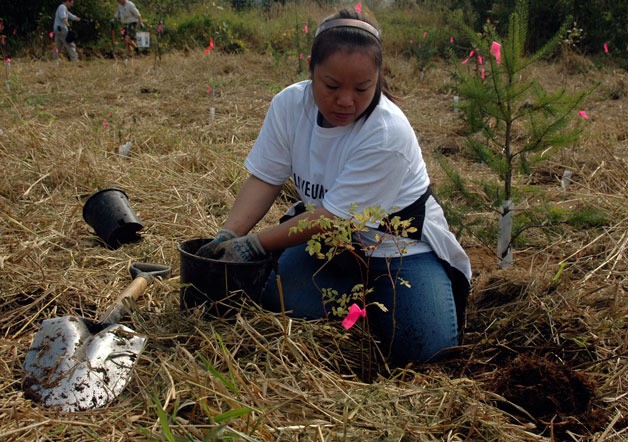MARYSVILLE — Between Sept. 23 and 24, close to 100 volunteers showed up at Harborview Park in southern Marysville to help get the local ecosystem going again, even though most of them don’t live or work in town.
The nearly 60 volunteers from Philips Healthcare, the Everett YMCA and the Sno-Isle Libraries who turned out on Friday, Sept. 23, represented the start of the Qwuloolt Estuary Restoration Project. They and their fellow volunteers on Saturday, Sept. 24, planted more than 850 native trees and shrubs on eight-tenths of an acre on the eastern side of the Qwuloolt Estuary, but over the course of the next 15 months the restoration project plans to conduct such plantings on 10 acres of territory around the marsh.
Sound Salmon Solutions, formerly known as the Stilly-Snohomish Fisheries Enhancement Task Force, is working with the Tulalip Tribes to get the restoration site ready for the breaching of the levy in 2013.
“This was the first time we really got our hands dirty on this project,” said Kristin Marshall, habitat restoration ecologist for Sound Salmon Solutions.
Marshall explained that restoring this estuary contributes to the salmon population of Puget Sound as a whole, since salmon recovery efforts have been limited due to extensive diking and tide gates. She added that restricting the watershed’s rivers from reaching wetland areas in the floodplain has created a bottleneck in salmon recovery efforts.
Josh Meidav, restoration ecologist for the Tulalip Tribes, explained that the plantings will contribute to jumpstarting the ecosystem’s natural regeneration.
“Restoring the tidal processes to the 360 acres of estuary will also allow river flows to deposit nutrient-rich sediments,” said Meidav, who described the restoration of the estuary’s channel connectivity and ecological processes as critical for the development of habitat in which salmon and other wildlife can be reared.
While this multifaceted project will ultimately also include the placement of engineered logjams and the re-contouring of the Allen and Jones creeks, the volunteers on Sept. 23 and 24 had plenty of work cut out for them just on their stage of the project, as they dug into tough reed canary grass to plant their trees and shrubs, applying mulch around the planting areas and wrapping protective cuffs around the plants themselves to prevent voles from munching on them.
“The mulch helps the soil retain moisture in dry seasons and acts as a weed suppressant,” Marshall said on Sept. 23. “All our plants are already flagged pink, so we can check up on them again. The Department of Corrections will be doing a site walk-through on Tuesday (Sept. 27) to water the plants, but we’ll be coming back later this fall and in the spring of next year for site maintenance and to cut back the reed canary grass.”
Gayle Bennett, a senior marketing manager with Philips Healthcare, came all the way from Kenmore to spend her day digging in the dirt on Sept. 23.
“It’s great to be able to spend time with the folks you know from work in different ways,” Bennett said. “It’s important to be part of the community and it’s great when we can do something to give back.”
“It’s always important to help the health of the environment,” said Beth Benson, a Philips Healthcare employee from Woodinville. “What we’re really doing is helping the kids who will come after us.”
“Without volunteer help, a lot of these things just wouldn’t get done,” said fellow Philips Healthcare employee Barbara Bannister, a Bothell resident. “This is sweat equity for a worthwhile cause.”



